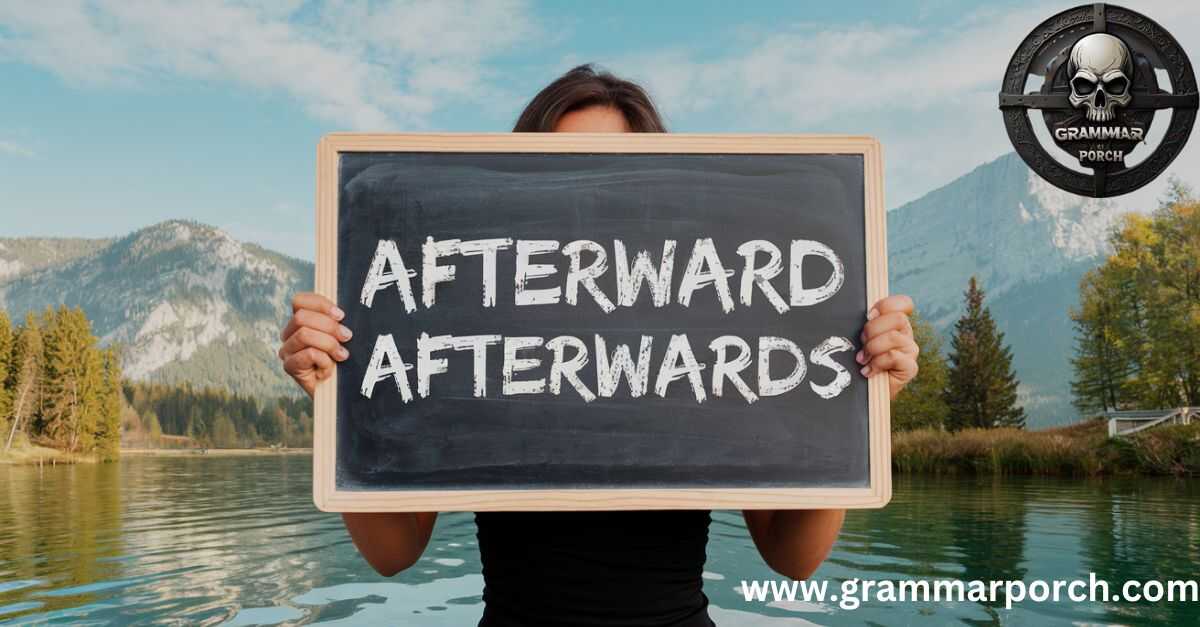In the vast landscape of English grammar, few words cause as much confusion as “afterward” and “afterwards.” These commonly confused words often leave writers scratching their heads, wondering which one to use in their sentences.
But fear not! This comprehensive guide will demystify the afterward vs. afterwards conundrum, helping you master their usage and elevate your English language skills.
Why is There Confusion?
The confusion between “afterward” and “afterwards” stems from their nearly identical meanings and the subtle differences in their usage across various English-speaking regions.
Both words function as adverbs, indicating that something happens after a specified time or event. However, their interchangeability in many contexts adds to the perplexity.
Key factors contributing to the confusion:
- Regional variations (American vs. British English)
- Similar pronunciation
- Identical meaning in most contexts
- Inconsistent usage in media and literature
This linguistic puzzle challenges even native speakers, making it a prime example of commonly confused words in the English language. As we delve deeper into this topic, we’ll unravel the nuances that set these words apart and provide you with the tools to use them confidently.
What Do ‘Afterward’ and ‘Afterwards’ Mean?
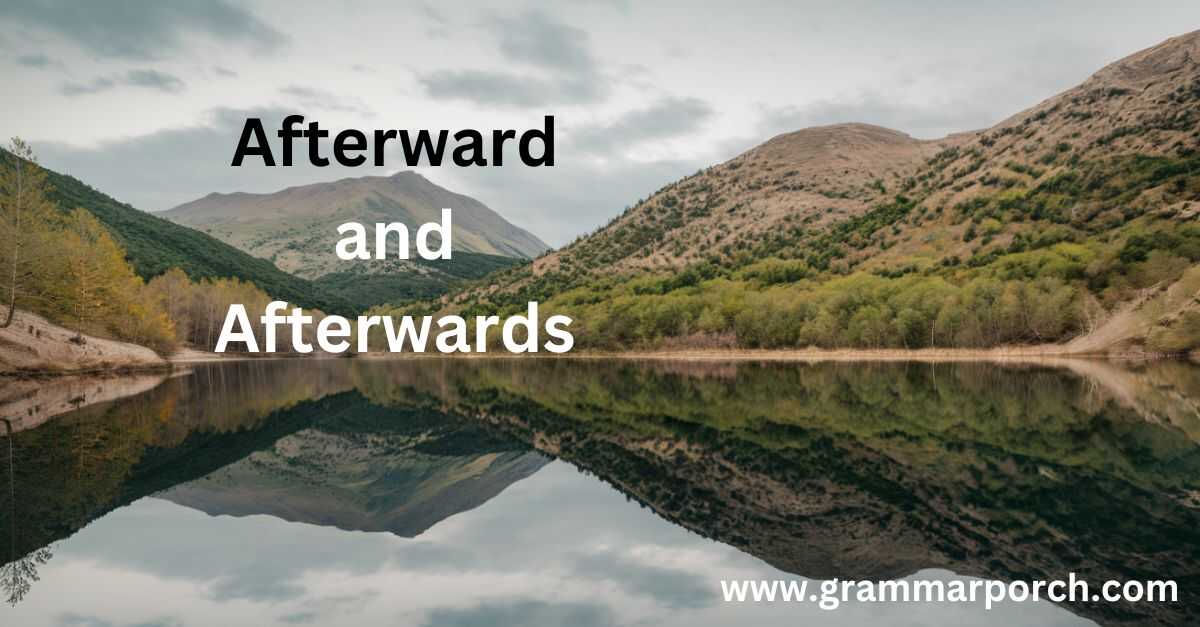
Before we dive into the differences, let’s establish a clear understanding of what these words actually mean.
Afterward Meaning: “Afterward” (without the ‘s’) is an adverb that means “at a later or succeeding time” or “subsequently.” It refers to events or actions that occur after a specific point in time or after another event.
Afterwards Meaning: “Afterwards” (with the ‘s’) carries the same meaning as “afterward.” It also denotes “at a later time” or “subsequently.”
In essence, both words describe subsequent events or later times. The core meaning remains consistent whether you’re using “afterward” or “afterwards.” This shared definition is precisely why many writers find it challenging to choose between the two.
“Afterward” vs “Afterwards”: The Differences
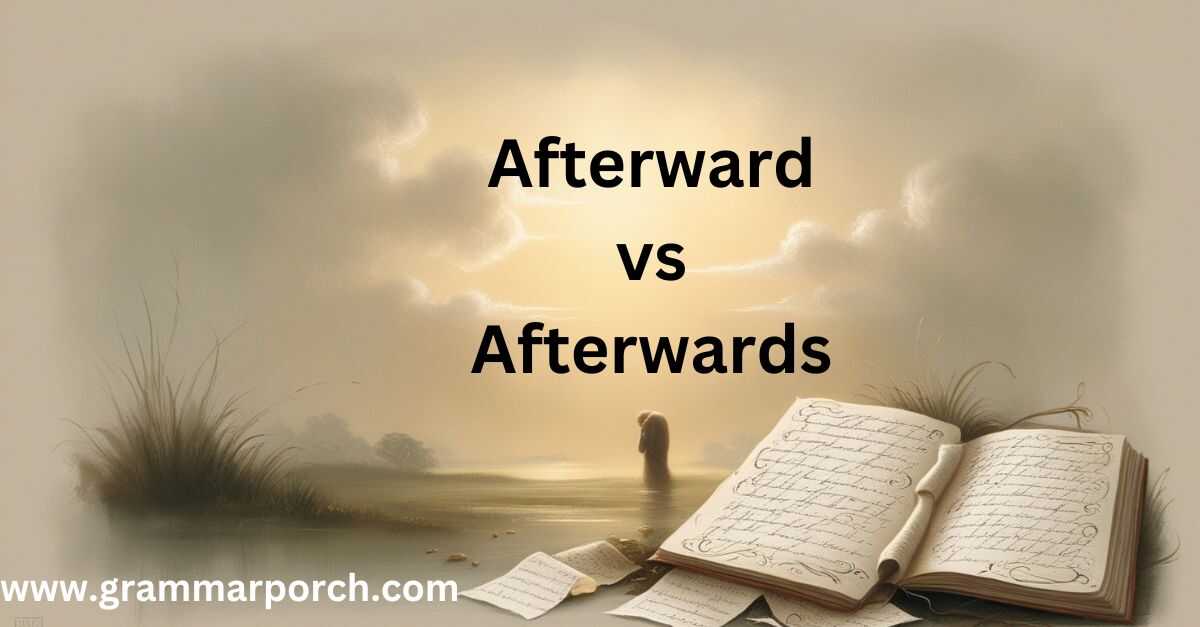
While “afterward” and “afterwards” share a meaning, there are subtle differences in their usage that every English language learner should be aware of:
- Regional Preference:
- “Afterward” is predominantly used in American English.
- “Afterwards” is more common in British English.
- Formality:
- “Afterward” is often perceived as slightly more formal in American English.
- “Afterwards” can sound more casual or conversational to American ears.
- Historical Usage:
- “Afterwards” is the older form, with roots tracing back to Middle English.
- “Afterward” emerged later as a variant, gaining popularity in American English.
- Style Guide Recommendations:
- Many American style guides prefer “afterward.”
- British style guides typically recommend “afterwards.”
It’s important to note that these differences are primarily matters of style and regional preference rather than strict grammatical rules. In most contexts, both words are considered correct and can be used interchangeably without altering the meaning of a sentence.
How to Remember the Difference
Mastering the use of “afterward” and “afterwards” doesn’t have to be a daunting task. Here are some mnemonic devices and tips to help you remember when to use each word:
- The “S” for “British” trick:
- Remember that “afterwards” has an “s” at the end, just like “British.”
- This can help you associate “afterwards” with British English usage.
- American “short” version:
- American English often favors shorter words.
- “Afterward” is shorter than “afterwards,” making it the preferred American version.
- Context clues:
- Pay attention to the surrounding text. If you’re reading or writing in a predominantly American context, “afterward” is likely the better choice.
- In a British or international setting, “afterwards” might be more appropriate.
- Practice with opposites:
- Learn opposite words to help reinforce your understanding:
- Before ↔ Afterward/Afterwards
- Previously ↔ Subsequently
- Learn opposite words to help reinforce your understanding:
By consistently applying these memory aids and practicing with various sentences, you’ll soon find yourself naturally choosing the appropriate word for your context.
British English Words Ending in ‘s’ vs American English
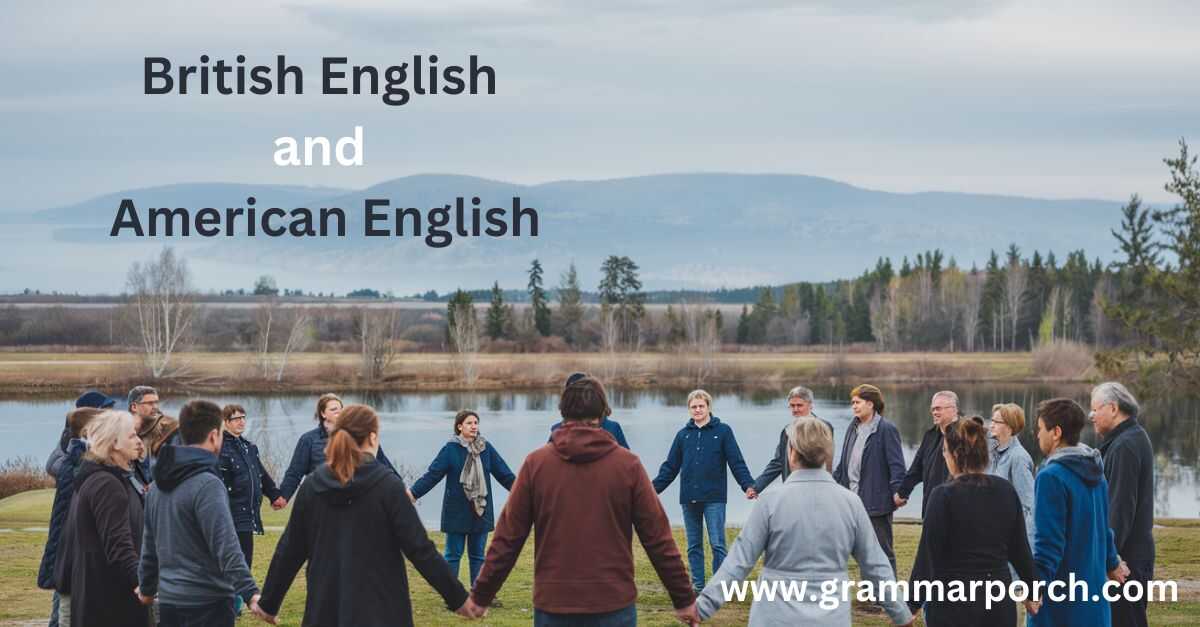
The “afterward” vs. “afterwards” distinction is just one example of a broader pattern in British and American English. Many words have slight spelling variations between these two major English dialects, often involving the presence or absence of an ‘s’ at the end.
Here’s a table showcasing some common examples:
| British English | American English |
| Towards | Toward |
| Forwards | Forward |
| Backwards | Backward |
| Downwards | Downward |
| Upwards | Upward |
This pattern extends beyond adverbs. For instance, British English tends to use “-ise” endings for certain verbs, while American English prefers “-ize” (e.g., “realise” vs. “realize”).
Understanding these patterns can help English language learners navigate the subtle differences between British and American English, improving their overall language skills and adaptability in various English-speaking contexts.
Which One Should You Use: “Afterward” or “Afterwards”?
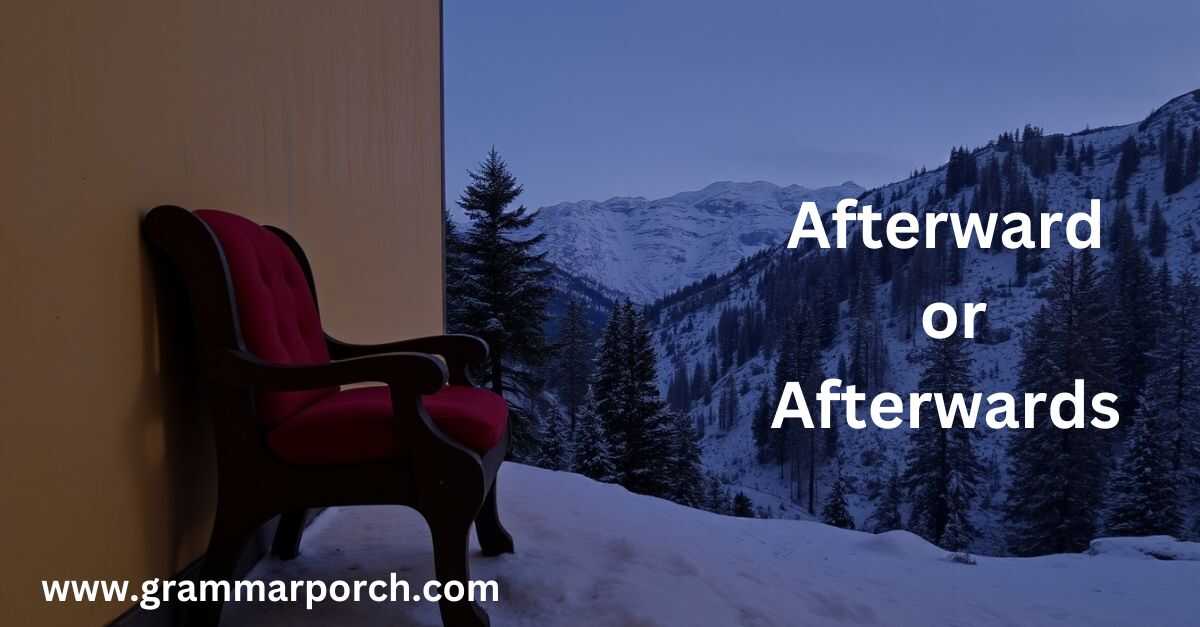
Choosing between “afterward” and “afterwards” ultimately depends on several factors:
- Your audience:
- If writing primarily for an American audience, opt for “afterward.”
- For a British or international audience, “afterwards” might be more appropriate.
- Consistency:
- Whatever form you choose, maintain consistency throughout your document.
- Style guide requirements:
- If writing for a publication or organization, adhere to their style guide preferences.
- Personal preference:
- In informal writing, you can choose the version you’re most comfortable with.
- Context:
- Consider the overall tone and style of your writing. Match your choice to the formality level of your piece.
Remember, both forms are widely understood, so don’t stress too much over the choice. The most important thing is to use the word correctly in context and maintain consistency in your writing.
Pronunciation of “Afterward” or “Afterwards”
While the spelling may differ, the pronunciation of “afterward” and “afterwards” is virtually identical in most English-speaking regions. Here’s a breakdown of the pronunciation:
- Afterward: /ˈæf.tɚ.wɚd/ (US), /ˈɑːf.tə.wəd/ (UK)
- Afterwards: /ˈæf.tɚ.wɚdz/ (US), /ˈɑːf.tə.wədz/ (UK)
The only noticeable difference is the slight ‘z’ sound at the end of “afterwards.” However, in rapid speech, this distinction is often barely perceptible.
Pro tip: To improve your pronunciation, try using a language learning app like Promova. These apps often feature native speaker audio samples, helping you perfect your accent and intonation.
Examples in Context
To better understand how “afterward” and “afterwards” are used in real-life situations, let’s examine some examples:
Afterward Examples
- We had dinner, and afterward, we went for a walk in the park.
- The meeting ended at noon; John left for lunch afterward.
- She finished her exam and felt relieved afterward.
- Afterward, he realized he had forgotten his keys at home.
- The team celebrated their victory, and afterward, they headed to the locker room.
Afterwards Examples
- We attended the concert, and afterwards, we grabbed a late-night snack.
- She completed her presentation; afterwards, she took questions from the audience.
- The storm passed, and afterwards, the sky cleared beautifully.
- Afterwards, they discussed the implications of the new policy.
- He read the contract carefully; afterwards, he signed it without hesitation.
As you can see, both words function identically in sentences, reinforcing the fact that they can be used interchangeably in most contexts.
Synonyms and Similar Terms to “Afterward” and “Afterwards”
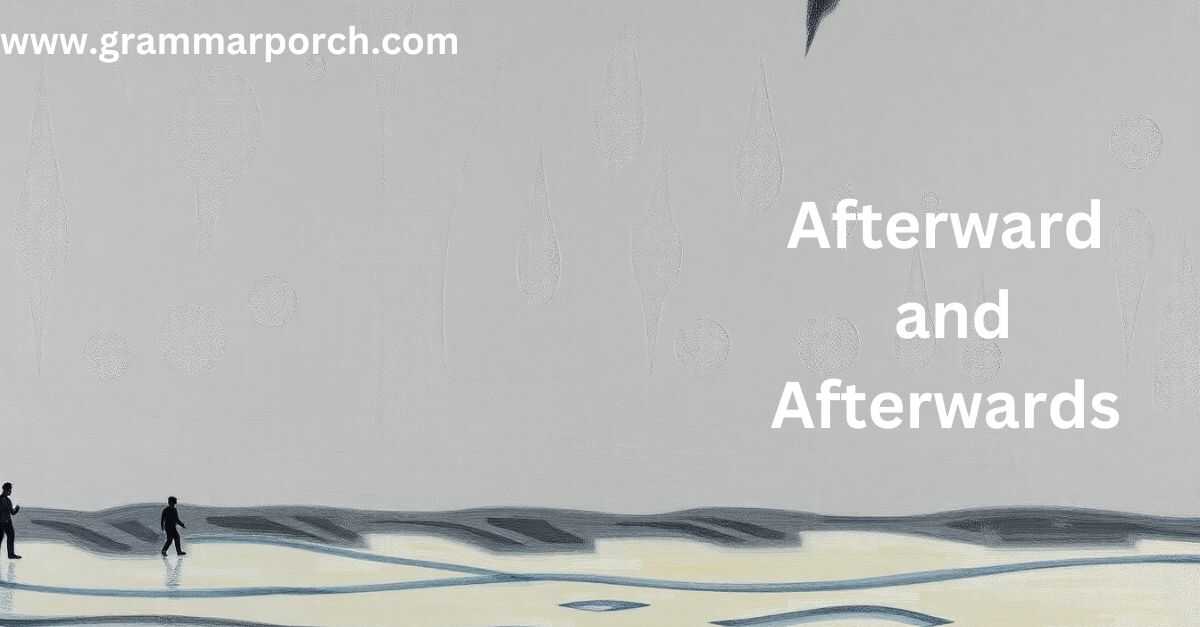
Expanding your vocabulary with synonyms and similar terms can enhance your writing and help you avoid repetition. Here are some alternatives to “afterward” and “afterwards”:
Synonyms for Both “Afterward” and “Afterwards”
- Subsequently
- Later
- Then
- Next
- Following that
- Thereafter
More Specific Alternatives
- Immediately after: Right after, Straight away
- Much later: Eventually, In due course
- In sequence: Sequentially, In turn
- As a result: Consequently, As a result
Using these alternatives can add variety to your writing and help you express time relationships more precisely. However, be cautious not to overuse complex synonyms, as this can make your writing feel forced or overly formal.
Origins of “Afterward” and “Afterwards”

Understanding the etymology of “afterward” and “afterwards” can provide valuable insights into their usage and evolution over time.
Origins of “Afterward”
The word “afterward” is derived from the Old English “æfterweard,” which combined two elements:
- “æfter” meaning “behind, later”
- “weard” meaning “toward”
Over time, this compound evolved into the Middle English “afterward,” which has remained relatively unchanged in its modern form.
Origins of “Afterwards”
“Afterwards” has a similar origin but with an additional element:
- It starts with the same Old English “æfterweard“
- The “-s” at the end is a remnant of the Old English genitive (possessive) case ending
This genitive ending gradually lost its grammatical function but remained as part of the word, giving us the modern “afterwards.”
The retention of this “-s” ending in British English, while it was dropped in American English, is part of a broader pattern of spelling differences between the two major English dialects.
Key takeaways:
- “Afterward” and “afterwards” have the same meaning.
- “Afterward” is preferred in American English; “afterwards” in British English.
- Both forms are widely understood and often interchangeable.
- Consistency in usage is more important than strictly adhering to regional preferences.
- Context, audience, and style guide requirements should guide your choice.
Conclusion
Mastering the nuances between “afterward” and “afterwards” is just one step in your journey to becoming proficient in English.
While the difference may seem minor, understanding such subtleties can significantly enhance your language skills and writing proficiency.

Larry is an experienced blogger with a passion for simplifying grammar. With years of expertise in writing and language, he shares insightful tips on punctuation, synonyms, and the intricacies of English grammar at **Grammar Porch**. His approachable style helps readers improve their writing skills with ease.

